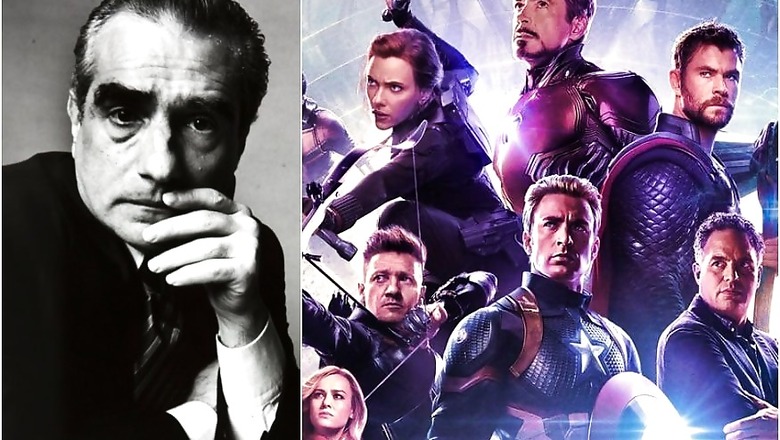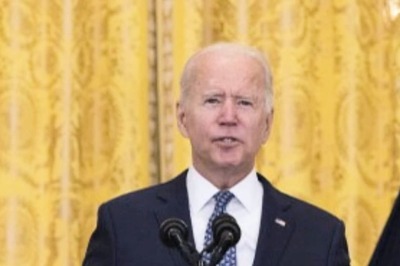
views
In November this year, Martin Scorsese stirred debate around superhero films and other cinema. The Academy Award-winning director lambasted the Marvel Cinematic Universe and compared it with theme parks.
Talking about the multi-billion dollar films, he said, “I don’t see them. I tried, you know? But that’s not cinema. Honestly, the closest I can think of them, as well-made as they are, with actors doing the best they can under the circumstances, is theme parks. It isn’t the cinema of human beings trying to convey emotional, psychological experiences to another human being.”
Marvel fans were offended and they immediately took up the cause on social media and challenged Scorsese. They were backed up by some of the makers of Marvel movies, too, including Guardians of the Galaxy helmer James Gunn, Avengers director Joss Whedon and Thor Ragnarok director Taika Waititi.
While Gunn said, “Some superhero movies are awful, some are beautiful. Like Westerns and gangster films, not everyone will be able to appreciate them, not even some geniuses. And that’s okay.”
Waititi took the debate at face value saying, “It’s at the movies. It’s in cinemas.”
Samuel L Jackson too spoke on the matter. He brushed it off by saying, “That’s like saying, ‘Bugs Bunny ain’t funny.’”
This was not the first, and definitely not the last time, when somebody spoke against the genre. Last year, Oscar-winning filmmaker James Cameroon said that he hopes the industry starts getting tired of the Avengers storyline. Then too, members of the film fraternity came forward with their opinions.
It was argued that superhero films are relevant in the current times as they establish the thematic complications of the real world. The genre is said to have given in the past two decades an ideal pop-culture response to some of the most politically and socially relevant issues like suppression of financially unstable troupe by the rich- Joker, identity crisis- The Hulk, stereotypes underestimating the capability of people of colour- Black Panther and representing stronger women in multiple films like Captain Marvel and Aquaman.
With Avengers: Endgame, they also made a commentary on the devastating effect of climate change or in the words of Greta Thunberg, ‘mass extinction’.
Also read: Is Remaking South Indian Films Bollywood's New Multicrore Superhit Formula?
But the debate didn't stop there. Later, in a New York Times piece, Scorsese further explained his comments saying, “In many places around this country and around the world, franchise films are now your primary choice if you want to see something on the big screen.”
He’s not wrong. Across the globe, people in large number went to theaters to see franchise or superhero films. Three out of the five highest-grossing films of 2019 are superhero movies, reports Box Office Mojo. While Avengers: Endgame minted over USD 2.7 billion, gaining the top slot, Spider-Man Far from Home and Captain Marvel were at number three and four with worldwide earnings of USD 1.13 billion and USD 1.12 billion, respectively.
The other films at number two and five were The Lion King (USD 1.65 billion) and Frozen 2 (USD 1.11 billion). While the other two might not be of the superhero genre but they definitely aren't anything close to what Scorsese would consider as cinema.
So, is Hollywood all about superhero films? Box office wise, it seems so. However, Scorsese's concern about the "generation that thinks cinema is a blockbuster,” is worth a thought. Audiences aren’t going to theaters to see films like before. The worry for the regular films, the non-blockbusters is justified, as the comic book films, their sequels and remakes get more number of screens than regular cinema.
Also read: Here's Why Saand Ki Aankh is the Most Feminist Hindi Film of the Year
In June, when Scorsese was releasing his semi-fictional documentary Rolling Thunder Revue: A Bob Dylan Story, he mentioned being bothered about multi-screen cinemas playing Endgame on 11 of its 12 screens, reported Associated Press.
For instance, Avengers Endgame reportedly in its opening weekend got a much greater number of screens as compared to movies like Jordan Peele’s Us and Quentin Tarantino’s Once Upon a Time in Hollywood.
Occupying most of the screens, superhero and franchise films leaves little room for ambitious stand-alone movies by filmmakers who are dealing with riskier stories. The aspiring filmmakers might be restricted from experimental storylines and would make similar kind of films as the money-making studios will be less inclined to take a risk.
Even box office rulers Joe and Anthony Russo second that. "When you talk about making character movies like 'Cherry' (after four Marvel sequels), even we are finding that is becoming increasingly difficult as the months pass - not as the years pass, as the months pass," Joe told New York Times.
"It is a tough market, even for us coming off 'Endgame', to make a darker, character-driven movie. It's not what the market was even two years ago," he added.
That said, as someone who jumped out of the seat when Captain America says ‘Avengers Assemble’ and shed a tear at Tony Stark's funeral, there is no doubt audience's love for Marvel movies and stuff that Scorsese refuses to call cinema will stay for a long time but doesn’t mean they can’t love other things.
Also Read: How Hindi Films Turned Into a Tool to Form New Narratives in 2019
Turns out, the debate isn’t about the popularity of superhero films, or their lack of originality and being cinematic— it’s the lack of supply of other varied films competing to get equal screen time. There's a possibility that if the audience had enough choices at the multiplexes to watch films of other genres, they might turn up for them too.
Since releasing its first Disney produced Marvel movie in 2012, the company has reportedly raked in more than USD 18.2 billion at the global box office. In total, all of the movies in the Marvel Cinematic Universe have made more than $22 billion at the global box office by June 2019. And with multiple films and television series panned out in 2020 and 2021 it’s already on its way to make billions more.
In the entire debate, Hollywood studios emerge as winners minting multi-billion dollars round the year. While filmmakers, actors and audience fight over "cinema," the giant Studio houses are churning out money like never before.
Also Read: Riding High on Toxic Masculinity, How Kabir Singh Became the Most Talked About Film of 2019
Follow @News18Movies for more



















Comments
0 comment